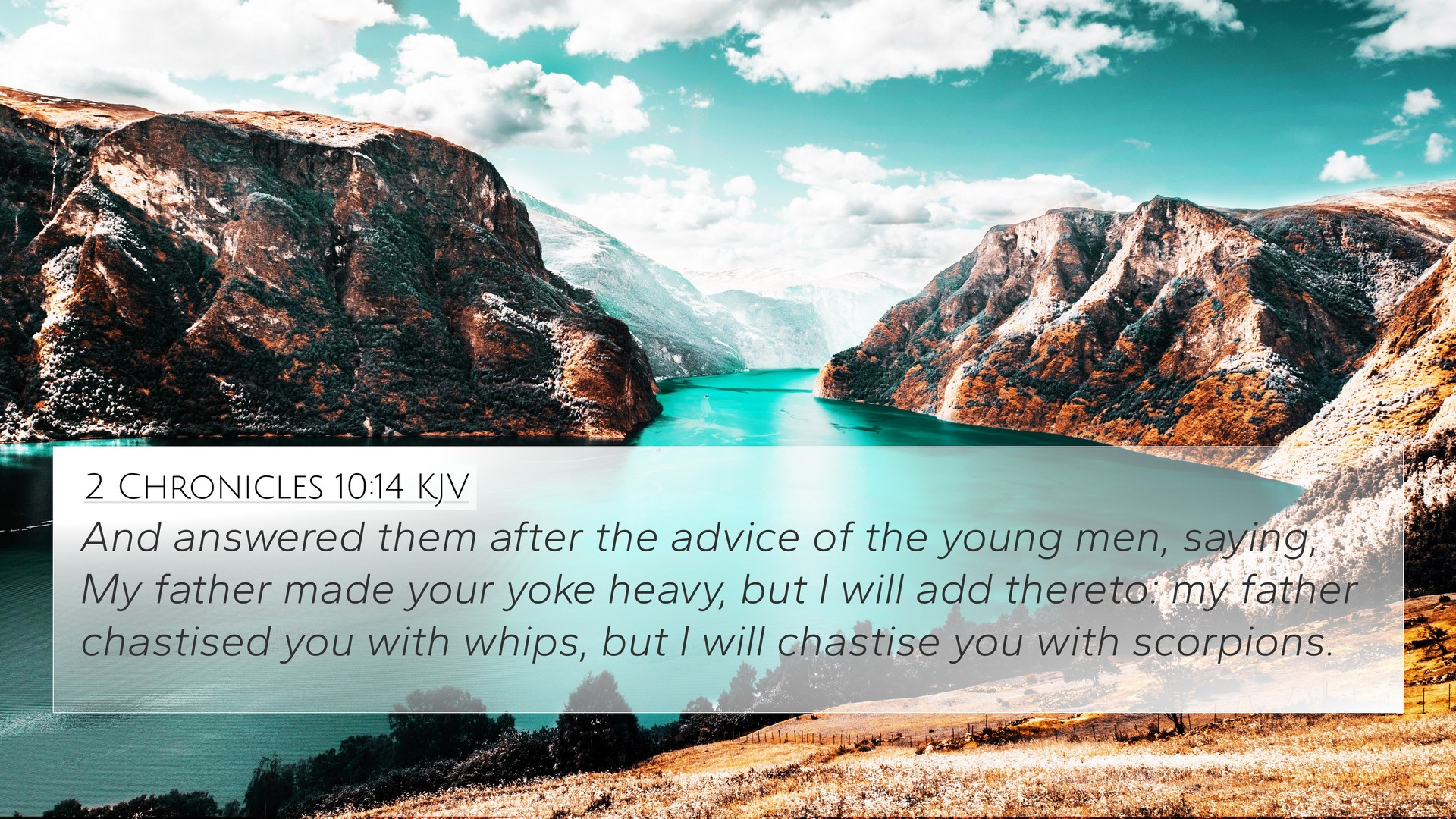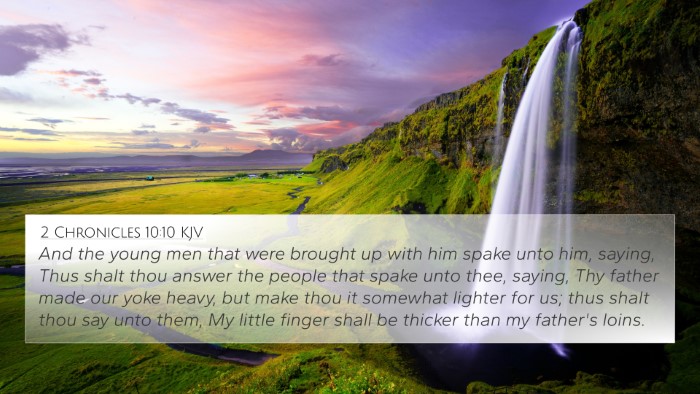Understanding 2 Chronicles 10:14
Verse Reference: 2 Chronicles 10:14
Verse Text: "And he answered them after the advice of the young men, saying, My father made your yoke heavy, but I will add unto your yoke: my father chastised you with whips, but I will chastise you with scorpions."
Summary of the Verse Meaning
This verse captures a pivotal moment in the reign of King Rehoboam, who responds to the demands for lighter burdens from the people of Israel. After consultations with youthful advisors, he chooses a path of greater severity, indicating a lack of wisdom and compassion. The imagery used highlights a shift towards harsher governance, contrasting the approach of his father, Solomon. The decision not only reflects Rehoboam's character but also the broader themes of leadership and the consequences of counsel.
Insights from Public Domain Commentaries
Matthew Henry's Commentary
Matthew Henry emphasizes Rehoboam's foolishness in heeding the advice of young men over the counsel of seasoned elders. He points out that good leadership requires wisdom and humility, traits that Rehoboam lacked. The commentary underscores that taking counsel that aligns with one's desires rather than seeking wise advice leads to disaster.
Albert Barnes' Notes on the Bible
Albert Barnes highlights the implications of Rehoboam's statement about chastisement. He draws attention to the historical context of tax burdens in ancient Israel and illustrates that the response was not just about physical labor but also indicated a misunderstanding of leadership roles. Barnes suggests that this choice ultimately fractured the unity of the kingdom.
Adam Clarke's Commentary
Adam Clarke provides a deep dive into the metaphor of the yoke and the scorpions. He elaborates on the harsh nature of the latter, implying that Rehoboam was prepared to be far more oppressive than his father. Clarke warns against leaders who disregard the voice of the people and choose to rule by fear rather than by wisdom and fairness.
Bible Verse Cross-References
- 1 Kings 12:10-11: This passage also frames Rehoboam’s decision making within the context of the people's request, offering a parallel view of the incoming king's reactions.
- Proverbs 15:22: Proverbs stresses the importance of seeking counsel, affirming the wisdom that comes from many advisors. This reflects Rehoboam’s failure in seeking wise counsel.
- Galatians 6:7: The principle of sowing and reaping resonates here, as Rehoboam’s harshness would ultimately lead to the division of his kingdom.
- James 1:5: This verse reminds believers to seek wisdom from God, contrasting Rehoboam's reliance on youthful advice.
- Ecclesiastes 4:13: The wisdom of age over youth is reiterated, reflecting the need for experienced leadership.
- 2 Chronicles 10:5: Represents the ask from the people, which directly leads into Rehoboam's subsequent response.
- Proverbs 29:2: A righteous ruler brings joy to the people, contrasting the frustrations brought by Rehoboam’s tyranny.
Connections Between Bible Verses
The story of Rehoboam is intricately linked to themes of leadership found throughout scripture. A comparative Bible verse analysis can reveal how various leaders throughout both the Old and New Testaments responded to counsel, the expectations of their followers, and the outcomes of their choices.
Thematic Bible Verse Connections
- Leadership and Humility: Numerous scriptures emphasize the importance of being humble (e.g., Philippians 2:3). Comparatively, Rehoboam's pride led to his downfall.
- Advice and Counsel: Throughout Proverbs, wisdom in seeking counsel is highlighted (e.g., Proverbs 19:20), which relates directly to Rehoboam’s choice.
- The Impact of Authority: Romans 13:1-2 discusses the role of authority, paralleling how Rehoboam’s decisions impacted the people.
Cross-Referencing Biblical Texts
Learning to find cross-references is a vital tool for deeper scripture understanding. Consider the use of a Bible concordance or Bible cross-reference guide to see how 2 Chronicles 10:14 aligns with other verses addressing leadership and counsel.
Conclusion
In summary, 2 Chronicles 10:14 serves as a lesson on the importance of wise counsel and the responsibilities of leadership. The severe answer given by Rehoboam illustrates the consequences of unwise decisions made in a position of authority, highlighting that the path of leadership should be paved with wisdom, compassion, and a genuine concern for the welfare of the people.











